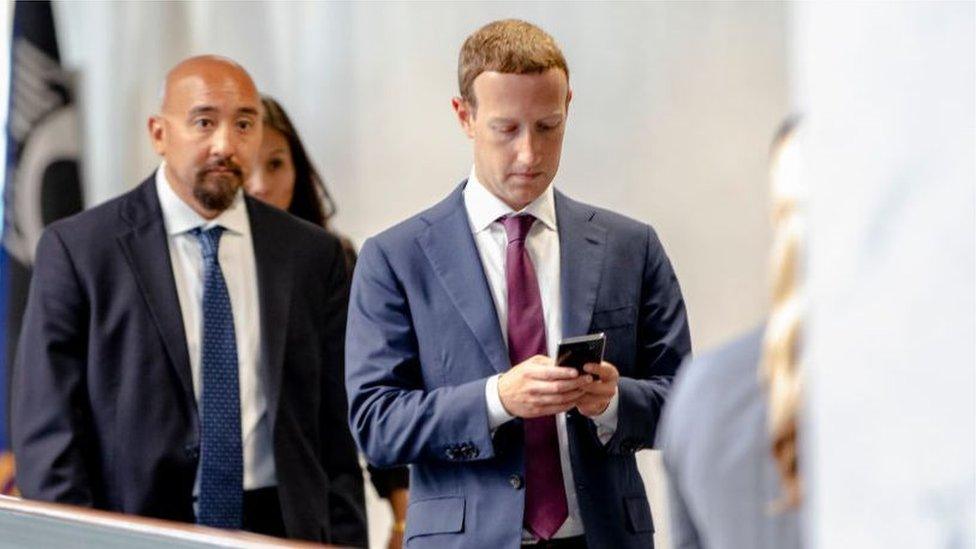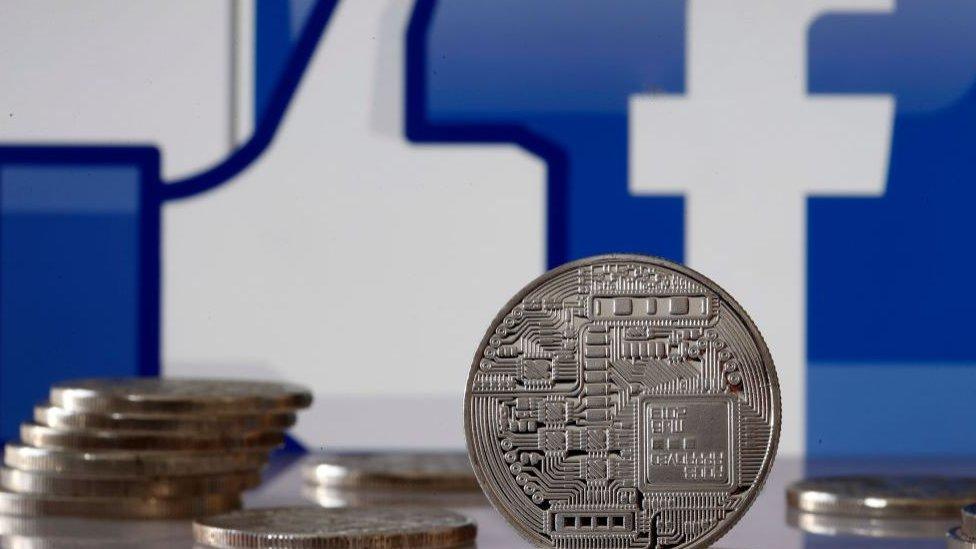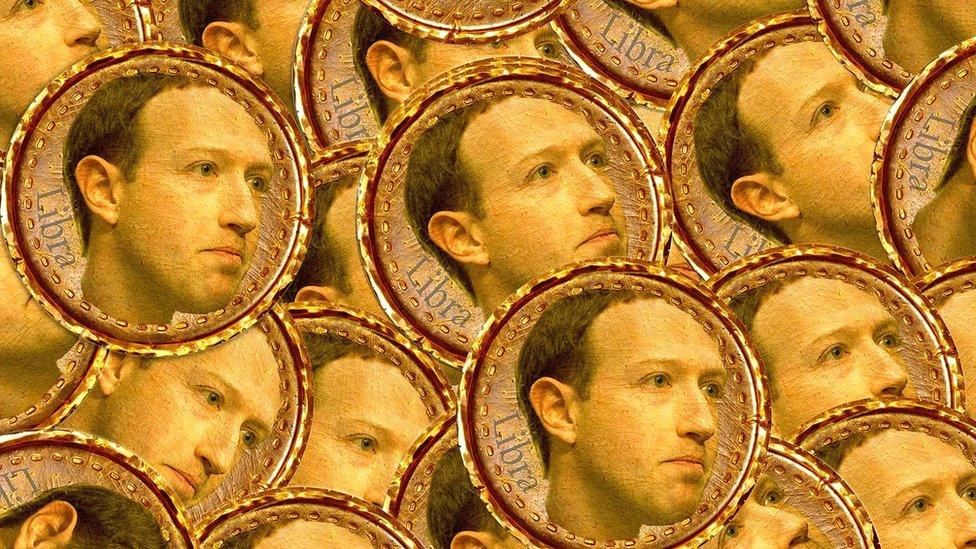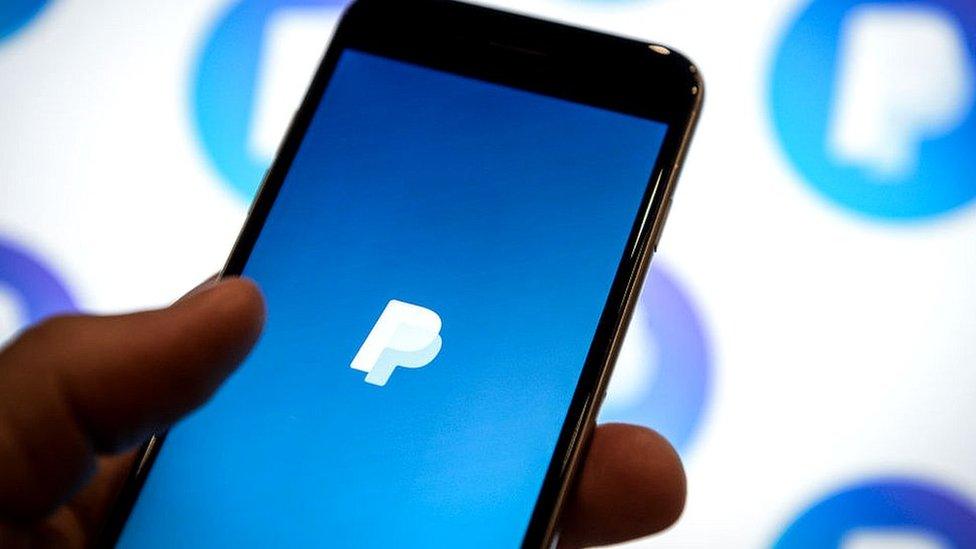Facebook's partners yet to commit money to Libra
- Published

Mark Zuckerberg will appear before the House Financial Services committee on Wednesday
None of the 20 firms partnering with Facebook on its Libra cryptocurrency project have yet committed to financially backing the effort, the BBC understands.
Facebook said in June the founding partners would be expected to each inject $10m, but so far no agreement has been made, and the fee was not discussed at the Libra Association’s first general assembly last week, according to several sources.
Mark Zuckerberg is expected to tell a Congressional hearing on Wednesday that Libra is “independent” and “we don’t control it”.
The Libra Association declined to comment. It would not say if it currently had any financial support from any source other than Facebook itself.
Set up by Facebook to govern the Libra cryptocurrency, the Association was officially formed on 14 October, days after several high-profile payments firms abandoned the project, citing fears over security, and political pressure.
Now the Association is in place, Facebook has said its influence is restricted as the other 20 members have an equal say over its actions. Facebook’s David Marcus was elected as one of Libra’s five board members. Members elected Bertrand Perez, formerly of PayPal, as Libra’s chairman.
‘China is moving quickly'
But Mr Zuckerberg has once again been summoned to the US capitol to address concerns from lawmakers over the potential for the Libra currency to be abused, or negatively disrupt the global financial order.
According to the written testimony submitted to the House Financial Services committee, Mr Zuckerberg will say: “We want to be clear: Facebook will not be a part of launching the Libra payments system anywhere in the world unless all regulators approve it.
"And we support [the Libra Association] delaying its launch until it has fully-addressed US regulatory concerns."
The statement would mark the first time the company has made an on-the-record pledge to lawmakers to only move ahead if US regulators are satisfied. The company had initially refused to rule out making that move when repeatedly pressed on the issue by the BBC in July, the last time Congress held a hearing to discuss the project.
Politicians in the US, as well as other countries, are concerned about Facebook’s involvement, coming as it does after a sustained period of data privacy violations. But Mr Zuckerberg is expected to reiterate his view that if the firm is not allowed to press ahead with Libra, the US risked ceding power to China.
“While we debate these issues,” he is expected to say, “the rest of the world isn’t waiting. China is moving quickly to launch similar ideas in the coming months.”

Facebook had said it hoped to launch Libra in 2020
He will add: “If American doesn’t innovate, our financial leadership is not guaranteed.”
The warning follows a speech the Facebook founder made in Washington DC last week, in which he criticised censorship on Chinese-owned app TikTok. “Is that the internet that we want?” he said.
‘Still a challenge'
Mr Zuckerberg is, however, aware that Facebook’s reputational crisis is an obstacle Libra needs to overcome if it’s to ever earn Washington’s blessing.
“I understand we’re not the ideal messenger right now,” Mr Zuckerberg will say at Wednesday’s hearing. "We’ve faced a lot of issues over the past few years, and I’m sure people wish it was anyone but Facebook putting this idea forward.”
Until it achieves financial autonomy, the assertion that the Libra Association is an independent organisation will be put in question.
One source at a partner company told the BBC: “We’ve seen Facebook start to move away from the Association a little bit, maybe, but it’s still a challenge for them, definitely.”
Libra Association companies told the BBC that no timeline for implementing the $10m fee had been set - but all said they would likely invest in the project when asked.
“Rather than collect a bunch of money from a bunch of people and then figure it out,” one said, "the feeling is that we needed to form, ratify a budget, and then figure out how to fund that budget, rather than the other way around.”
_____
Follow Dave Lee on Twitter @DaveLeeBBC, external
Do you have more information about this or any other technology story? You can reach Dave directly and securely through encrypted messaging app Signal on: +1 (628) 400-7370
- Published14 October 2019
- Published14 October 2019

- Published5 October 2019

